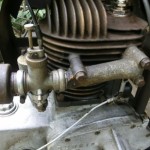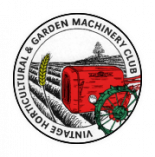Forum Replies Created
-
AuthorPosts
-
January 19, 2014 at 12:27 am #5209
 wristpinParticipant
wristpinParticipantPresumably the design engineers did the calculations and decided that, to give reliable performance under the most adverse conditions likely to be encountered, two belts would be necessary. Even in those pre cadcam days they wouldn’t have incurred the extra costs involved just for the fun of it!
However it’s interesting to note that a single A25 cogged belt was specified as the replacement for the twin plain A25 belt drive used on one of the early Mountfield cultivators. The Mounfield belt chart of the time notes the change just as a running substitution with no other engineering changes; so presumably the designers had either over-estimated the power requirement, or the advent of a belt with increased power handling allowed them to make a cost saving. Also, by using a single belt they avoided the “matched pair” requirement.
January 18, 2014 at 5:30 pm #5194 wristpinParticipant
wristpinParticipantDon’t know anything about Trusty clutches but used to experience a similar problem with Ransomes Mastiffs where a small amount of wear in a bush in the centre of the centrifugal clutch would allow the drum to tip slightly and and bind on the clutch centre transmitting drive even though the revs were not sufficient to engage the shoes.
January 15, 2014 at 10:17 pm #5166 wristpinParticipant
wristpinParticipantwhat is the best way to re=attach the friction segments to the plates on the Albion clutch
I would favour Loctite Multibond as it tolerates a less than perfectly clean surface and doesn’t go brittle when hard. Used it with success to re-bond Hayter21/Osprey clutch linings and the clutch pads on my BRL cylinder grinder.
January 15, 2014 at 1:29 pm #5154 wristpinParticipant
wristpinParticipantHi Steve, to fix the problem, rename the photo’s 001, 002, 003 etc…… The site software only recognises alpha numeric file names. Its been posted before about the problem, luckily its an easy self help fix!
Confused by your reply – surely his P…… Refs are alphanumeric and what you are suggesting is pure numeric ? Is that what the forum software needs to keep images in order?
January 14, 2014 at 9:53 pm #5136 wristpinParticipant
wristpinParticipantPerhaps that’s what’s preserved it !
January 14, 2014 at 8:21 pm #5131 wristpinParticipant
wristpinParticipantWhat I would call a modern classic and well worth preserving, not the least because many people don’t consider them rare or valuable enough to to be worth hanging on to – then there were none! Pity that the tank and engine cowl appear to have been treated to the wrong shade of green otherwise it could possibly preserved as it stands. Must have had a gentle life for the box to be as good as it appears.
January 13, 2014 at 11:34 pm #5124 wristpinParticipant
wristpinParticipantThat’s good, and cheap compared with the 28″ Atco one I had from them a year ago !
January 12, 2014 at 7:25 pm #5101 wristpinParticipant
wristpinParticipantAir cleaner-put it on as it will richen the mixture slightly.
Timing – hopefully there is someone on the forum who knows the precise method for your setup but from distant memory the engine should be rotated until the impulse trips and then turned back to the point at which the contact breakers just starting to open and the timing set then.
As I said, a distant memory and not specific to your engine!January 11, 2014 at 11:44 pm #5068 wristpinParticipant
wristpinParticipantIf you still have the sole plate just give me the hole centres for a start as that may rule out / give a glimmer of hope that any thing that I have may fit.
My guess is that Garfitts will be around the £35 mark.January 11, 2014 at 8:46 pm #5066 wristpinParticipant
wristpinParticipantTry Garfitts (OLC discount available. They will make to order.
If you can post or pm the dimensions – hole spacing and distance from front edge – and I’ll see what I have but not too hopeful.January 10, 2014 at 5:56 pm #5017 wristpinParticipant
wristpinParticipantThink that you’re right about red and white lead being prohibited now but should still be OK to use oakum and pitch to caulk the planking joints!
January 10, 2014 at 11:07 am #5006 wristpinParticipant
wristpinParticipantMy biggest battle over the years has been trying to persuade people who should have known better that copaslip type products should not be used as the primary lubricant when assembling bearings/bushes.
I second that, it’s copper based anti-seize, not grease!
January 9, 2014 at 12:57 pm #4986 wristpinParticipant
wristpinParticipantElectrolytic corrosion where aluminium and steel is a major problem on things like Land Rover especially when salt is added. One problem painting aluminium is getting a clean surface, an etch primer is essential.
Read an interesting article a while back warning against using a copper based anti seize compound such as Copaslip on steel bolts going into aluminium castings as it introduced a third element into the electrolytic corrosion equation. Have to plead guilty to that in the past. This particular article concerned Hillman Imp head bolts and the author’s recommendation to prevent thread galling was a drop of EP gear oil.
January 9, 2014 at 10:56 am #4983 wristpinParticipant
wristpinParticipantAnything that excludes air and moisture has to be better than nothing . Not sure if I have read your post about galvo correctly but while being fine for steel it is unlikely to be beneficial for aluminium alloys.
My guess is that if money was no object a new bearing housing given a couple of coats of epoxy primer would be the way to go, but to get an existing housing clean enough fot that to be effective would possibly destroy it.
I put a new deck shell onto a little Husky for the brother in law down in Somerset in the summer and fortunately went armed with a pair of good used bearing housings as his were crumbling away to nothing.January 8, 2014 at 1:59 pm #4976 wristpinParticipant
wristpinParticipantI seem to remember being told that the initial layer of oxide/corrosion would protect the underlying metal from further deterioration . That was the theory but in practice it does seem a bit different.
That said, the acids produced by a damp poultice of festering grass (and worse!) does seem to have the ability to corrode things like spindle housings to the point of destruction. “In season” in practical terms there is not a lot that you can do – weekly under deck hosing or pressure washing is not only a messy operation but can have undesirable effects to bearings etc.
Out of season with a dry deck I would suggest dry cleaning with a scraper and stiff brush (not wire) to clean off the crud but leaving the oxide layer and then give the housings a heavy coat of a waxoyl type product or heavy grease to exclude air.
When I was in business we used to coat the underside of “winter service” decks with “soft grease” -a brew much loved by the military back in the 50/60s for coating the underside of “mothballed”equipment and made by mixing heavy grease and engine oil and stirring to a semi fluid consistency and liberally applying with a wide paint brush. Our lubricant supplier used to offer us dented and damaged drums of grease at an acceptable price! -
AuthorPosts
